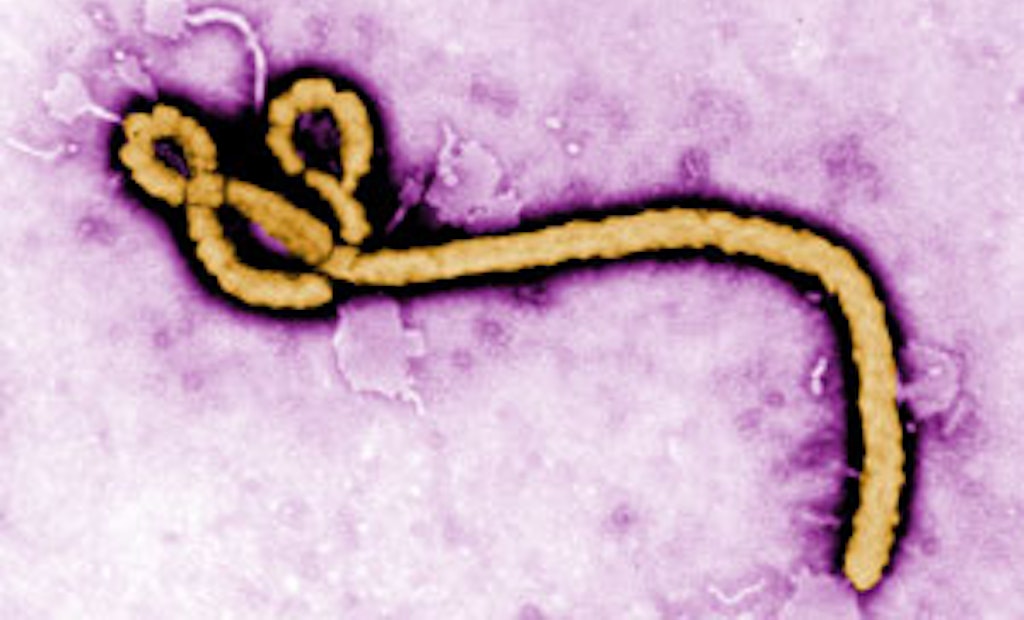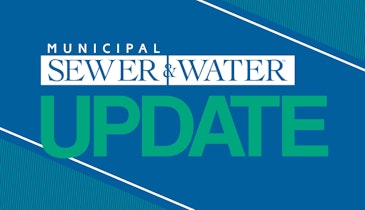
Interested in Safety?
Get Safety articles, news and videos right in your inbox! Sign up now.
Safety + Get AlertsMuch remains unknown about Ebola and the risks it may pose for those who work with wastewater and raw sewage. In the municipal workers can take simple, practical steps to protect themselves — mainly by using appropriate personal protective equipment (PPE).
Those were the key take-aways from a Nov. 4 webcast sponsored by the Water Environment Federation (WEF) and the Water Environment Research Foundation (WERF). Featured speakers represented those two organizations, along with the U.S. Centers for Disease Control and Prevention (CDC) and Spartanburg Water, a water and wastewater utility in South Carolina.
Of most practical interest was a presentation by John Westcott, Spartanburg Water’s special projects manager. He described how his agency assessed the risks to its workers from Ebola and devised safety practices for them that other utilities could easily replicate.
Other speakers outlined what is known about Ebola and how it can and cannot spread, and what research should be done as a basis for sound safety practices in wastewater environments.
Workers want answers
Since the first U.S. Ebola case in Dallas, Texas, municipal workers and water and wastewater treatment employees have pressed the CDC and water associations for information about the virus and worker safety. The CDC states that sanitary sewers may be used for the safe disposal of patient waste, and that means the virus could enter wastewater collection and treatment systems.
Meanwhile, Ebola research as it relates to wastewater is limited. Researchers know of only three studies that tested survivability of the virus, and none of those were conducted in settings similar to sewers or treatment plants environments.
Spartanburg Water started by assessing the risks of Ebola based on publicly available information. Among key findings:
- It is adapted to relatively high-ionic-strength environments, likely different from wastewater.
- It is susceptible to hospital disinfectants, including bleach.
- It is not transmitted through the air, although transmission through droplets (aerosols) has not been ruled out.
- It is typically not transmitted through water.
- Wastewater treatment disinfection likely inactivates the virus.
One key question he cited was how long the virus can survive in rag balls of flushable wipes or in patient dressings and feminine hygiene products that enter sewers.
“We are also interested in what is the highest-probability source — a hospital, a clinic or the home of an infected person,” Westcott said.
Taking action
“We couldn’t wait for answers. We needed to go ahead and start getting some contingency plans in place, looking at our PPE, and making decisions on the appropriateness of that. We needed to make some fairly conservative assumptions. We made the assumption that utility workers in a sewer collection system are potentially at risk, and that the highest potential risk would be from a hospital treating patients.
“Contact with body-fluid-contaminated debris seems to us to represent the highest risk. There’s a risk from splash or immersion in wastewater. We assumed that PPE decisions could be made based on the characteristics of the virus. It’s a matter of setting up a physical barrier.”
Accordingly, the utility’s PPE protocol includes:
- Goggles or an enhanced face shield with filtration for splashes to the face.
- Impermeable latex or nitrile gloves covered by leather gloves.
- Disposable Tyvek suits for body protection (coated Tyvek for immersion protection).
- Waterproof boots or waders.
- Ordinary good hygiene for ingestion prevention (washing with soap, not eating or chewing gum near sewage, laundering clothes at work).
What we need to know
Matthew Arduino, chief of the CDC’s clinical and environmental microbiology branch, emphasized that U.S. cases are very limited and quite contained. He also noted that Ebola is an enveloped virus, a type that is relatively fragile and well susceptible to disinfection — as in the case of HIV virus.
“In the U.S. the most at-risk population includes health care workers in hospitals treating an active case, or health care workers returning from West Africa,” Arduino observed. “Sewage handling processes in the U.S. are designed to remove pathogens…and viruses with envelopes do not have viability in certain environments.”
Some utilities are considering source control — the easiest way to contain risk — by asking hospitals to pretreat patient waste. A hospital in New York that has an active Ebola case is using a camping toilet with solidifier to keep the waste out of the sewer system.
Naoko Munakata, chair of the WEF Disinfection and Public Health Committee, stated, “We know Ebola could potentially be released to the sewers, but we don’t know how well it can survive in wastewater. Its state is also not known across various treatment processes. We have no data on the survival across these processes.”
She listed research needs including:
- Efficacy of disinfectants against Ebola
- Survival of Ebola in human wastes and environmental matrices
- Transmission risk
In the meantime
The good news is things are happening. Questions are being asked, and the CDC and other groups understand that answers are needed. Until better research is available, proper use of PPE and good hygiene practices are simple, prudent practices.
Arduino said the CDC will soon release an interim guide for wastewater workers. Until then, check is the CDC website, which is updated constantly as new information becomes available.
You can find an audio recording of the webinar along with the accompanying PowerPoint presentation at www.wef.org/EbolaWastewaterConcerns/.





